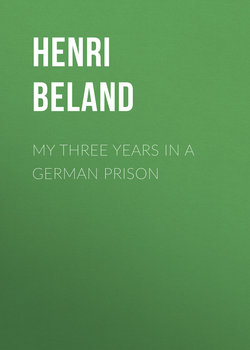Читать книгу My Three Years in a German Prison - Beland Henri Severin - Страница 10
CHAPTER X
THE WORD OF A GERMAN
ОглавлениеTowards the end of October, 1914, two or three weeks after the evacuation of the fortress of Antwerp, His Eminence Cardinal Mercier issued a pastoral letter to his clergy and people entreating the Belgians who took refuge in Holland during the terrible weeks of the bombardment of the northern region of Belgium to return to their homes.
This letter contained a special provision which is remembered to this day. The Cardinal stated that, after a conference with the German authorities, he was convinced the inhabitants of the Province of Antwerp would be exempt from all annoyances and would not be molested for any personal delinquency.
“The German authorities,” the Cardinal added, “affirm that in the event of any offence being committed against the occupying authority this authority will seek out the guilty party, but if the culprits be not found, the civil population need have no fears, as they would be spared.”
This was quite clear. The episcopal document was, of course, published in Holland and, consequently, many thousands of refugees returned to their homes in Belgium.
About the 15th of December of the same year–that is to say, about two months after the Cardinal’s letter appeared–two Capellen lads, 14 or 15 years of age, boarded a locomotive standing at the station, where it had been left by the engineer and fireman while they went to dinner. The boys amused themselves with the lever and soon had the engine running backwards and forwards alongside the station platform. Here they were caught by German soldiers who carried them off to Antwerp, where they were summarily tried, and sentenced to serve three weeks in jail.
The incident was considered closed; but not so, as we shall see. On the following day, Major Schulze, if I am not mistaken, the commanding officer at Capellen, requested the burgomaster to supply him with a list of twenty-four citizens, including the parish priest, the Rev. Father Vandenhout, and a former burgomaster, Mr. Geelhand. These twenty-four citizens, it was ordered, would be divided into groups of eight men each, and each group would, in turn, keep guard on the railroad every night from 6 o’clock until 7 o’clock the following morning, and this until further orders. This raised a hue and cry in the village. The citizens asserted, with reason, that the boys guilty of interfering with a locomotive had been caught; that the offence was not serious–was, in fact, nothing at all but the pranks of two boys. Everybody now recalled Cardinal Mercier’s letter, and the assurance upon which it was based, as given by the German authorities, namely, that no personal delinquency would be followed by reprisals against the civil population. What was to be done? Counsel was taken on all sides. The principal citizens met secretly and decided to submit the case to the Governor of Antwerp, General Von Huene.
But it was of no avail; the twenty-four citizens whose names appeared on the list were compelled to keep guard in front of the station during the cold, wet nights of December and January. On Christmas eve, the group to which the old priest, Father Vandenhout, belonged was on guard. This priest, about 70 years of age, and seven companions paced to and fro in front of the station, throughout a cold and stormy night. It was not until the 15th of January that an order from Antwerp ended this arbitrary ruling of the local military authorities.
It was at about that time that a new officer appeared at the chateau with a request that we should receive him in the house. This man was much less pleasant in manner than his predecessor. He had not lived in Spain or in Brazil. He had come straight from Eastern Prussia. He was violent and arrogant. He treated his orderly with extreme severity. The house trembled each time he started to scold the man, and this happened frequently enough. The officer left after a stay of three weeks, and God knows we never regretted his departure.
Once again we were free from the Germans’ presence. True, we could hear their heels tramping on the road outside, but under the domestic roof the family lived quietly in peace.
One of the Capellen physicians having returned from Holland, my wife and I decided, after consulting the children, to take steps to leave the occupied country, with the intention of crossing later to Canada.
